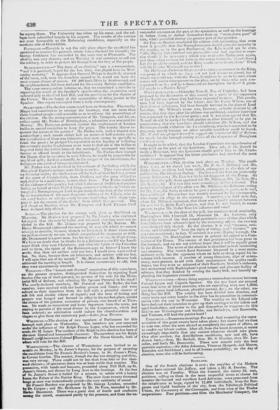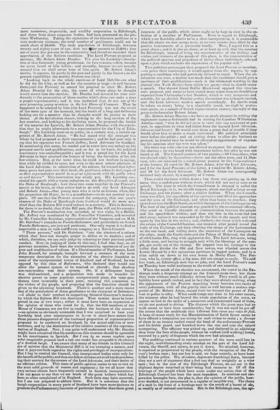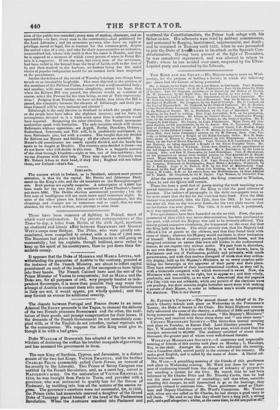most numerous, respectable, and wealthy corporation in Edinburgh, and three
from three corporate bodies, had been presented on the pre- vious Wednesday. Taking the signatures of the fourteen petitions at a very moderate estimate, the total number of petitioners could not be much short of 20,000. The male population of Edinburgh, between twenty and eighty years of age, does not Oise amount to 25,000; four out of every five persons in the community had therefore recorded their approbation of the Reform candidate. The Lord Provost proposed as member, Mr. Robert Adam Dundas. We give his Lordship's descrip- tion of that fortunate young gentleman, l'or two reasons,—first, because we never heard of him before ; and secondly, because we are morally assured that we shall never hear of him again. Mr. Robert Adam's merits, it appears, lie partly in the past and partly in the future; on his present capabilities the worthy Provost was silent.
" Looking back to the whole exertions of Lord Melville—to what :he did for the City, as well as for the country at large—it well became them (said the Provost) to second his proposal to elect Mr. Robert Adam Dundas for the city, the name of whom alone he thought would secure him the election. Mr. Dundas had devoted his time assi- duously to the prosecution of those studies which alone can make a man a proper representative ; and it was undenied that he was one of the most promising young members in the late House of Commons. That he happened to be selected by him (the Lord Provost), was not the result of the mere spur of the moment, but the result of a long and deliberate looking out for a member that he thought would do justice to their choice. At the last election dinner, looking to the long services of the last member, and looking to his declining years, he proposed the health of the member for Ipswich, Mr. Robert Adam Dundas, with the convic- tion that he might afterwards lie a representative for the City of Edin- - burgh." His Lordship went on to notice, in a cursory way, a certain op- ponent of Mr. Robert Adam. " He had stated who the stranger was whom he had proposed as their representative ; and he had now only to say that his opponent was Francis Jeffrey, Lord Advocate for Scotland. In mentioning this name, he needed not to enter into any eulogy on his personal merits and qualifications, and, so far as he knew, his political consistency was unchallengeable ; and it was a proud day fin- the Lord Advocate to have attained the honour of being the favourite of his fel- low-citizens. But, at the same time, he could not hesitate in saying, that while he yielded to none, not even to the most ardent admirers of the Lord Advocate, in admiration of his talents, lie trusted that before many years had gone over their heads, the gentleman whom he had proposed as their representative would be as great a favourite with the public when as well known." This reservation was wisely put. His Lordship con- cluded his speech with a warm eulogium on the Dumfries Journal, and the Duke of Buccleagh : how these two came together in the Provost's speech or his brain, or what either had to do with the Lord Advocate and Robert Adam—that young man who is to be so famous, when, like his progenitor old Harry, he is a grandfather—we do not pretend to ex- plain. Of one fact the Provost assured the company, that one year's absence of the Duke of Buccleugh from Scotland would do more mis- chief than the Reform Bill would redress in a century. This is decisive; for there is no doubt, that if the Bill pass, the Duke will cut his country.
The Provost's nomination was seconded, as was right, by a Baillie. Mr. Jeffrey was nominated by Mr. Councillor Chambers, and seconded by Mr. Councillor Gairdner, representative of the Surgeons and an M.D. Dr. Gairdner's remarks on Pseudo-Reformers, and particularly on Scotch Pseudo-Reformers, are just and pertinent. Our only regret is to find so respectable a man in such indifferent company as a Town-Council.
" These persons," said Dr. Gairdner, "are the abettors of a reform which they have not thought proper to define or to explain ; and of which, therefore, we can only judge by referring to their previous public conduct. Now, in judging of them by this test, I find that they, on all previous occasions, have been the uncompromising opponents of any de- gree and modification of reform. If a liberal member of Parliament, Lord • John Russell, for example, brought forward a measure of the most • temperate description for the extension of the elective franchise to • some of the unrepresented towns of England and of Scotland, he was opposed by this class of Reformers, who declared they would not allow the present system to be touched or altered ; that absolute nonintervention was their system. Or, if a delinquent burgh was disfranchised, and a proposition was made to transfer its elective power to some populous unrepresented place, the same gen- tlemen were invariably at their posts, resisting this concession to the wishes of the people, and proposing that the franchise should be given to the adjoining hundreds. There-is another and a more recent test of the pretensions of these gentlemen to the character of Reformers —I allude to their conduct in supporting General Gascoyne's motion, by which the Reform Bill was destroyed. That motion must be inter- preted in one of two ways ; either it must have been an expression of • the opinion of those who voted for it, that the 658 members of the House of Commons are too few to conduct the business of the country • —an opinion so obviously untenable that I was surprised to hear your Lordship lend your countenance to it—or it must have meant that those persons disapproved of the increased proportion of representatives .proposed to be conferred on Scotland, by the actual addition of new members, and by the diminution of the relative numbers of the represen- tatives of England. Now, I can quite well understand why Mr. Dundas might have conceived that his conduct on this occasion should be agreeable to his constituents in Ipswich. But I can by no means explain upon what imaginable grounds such a tale can render him acceptable to the electors of a Scottish burgh. I am aware that many of my friends in this Council are of opinion that the Ministerial Bill is of too sweeping a nature, and that it pays too little regard to the rights and privileges of incorporations. But I beg to remind the Council, that incorporated bodies exist only for the benefit of the public; and that our fellow-citizens are at all hands proclaim- ing their anxiety for the success of the Lord Advocate, and their desire of
an efficient reform. This state of public opinion seems to me to rest on the most solid grounds of reason and argument ; for we all know that very serious abuses have frequently existed in Scottish incorporations. ,I do not lean to say that we see much of the gross bribery which has been so often complained of in England. Such facts may have occurred,
but I am not prepared to adduce them. But it is notorious that the burgh corporations in many parts of Scotland have been more desirous to promote theParliamentary interests of particular families than those great interests of the public, which alone ought to be kept in view in the se- lection of a member of Parliament. Even in regard to Edinburgh, which your Lordship admits to be a close incorporation, it is undeniable that the chairs we now occupy were, at no very remote date, filled by the passive instruments of a particular family. Now I regard this as a great abuse ; and it is also an abuse, or at least an evil, that the member for Edinburgh, instead of being the representative of the feelings anal wishes and interests of the people of this place, is the representative of the political opinions and prejudices of thirty-three individuals, selected upon a plan which excludes the expression of the popular will."
Two judicious personages then proposed the Lord Provost as member, —to prove their consistency, it would appear from the reports, by sup- porting a candidate who had positively refused to stand. When the no- mination was over, a motion was made that the candidates should give a specimen of their qualifications—such is the whimsical wording in the journal (the North Briton) from which we quote—that is, should make a speech. Our shrewd friend Baillie _Blackwood opposed this treache- roils proposal, and seems to have waxed more warm than we should have expected from Christopher's last Number, which is very temperate and sensible, for an election Number ;—but the motion was at length carried, and the Lord Advocate made a speech accordingly. Its merits must be taken on trust; being in a charitable mood, we shall by prefer- ence quote, as a sample of Scotch representative oratory, the reply of the
great-to-be-hereafter Robert Adam. •
Sir. Robert Adam Dundas—we have as much pleasure in writing the euplionous name as Goldsmith had in writing his Carolina Wilhehnifut Amelia—said, " that he did not mean to enter into any argument at pre- sent, in opposition to what had fallen from the learned Lord Advocate. (Gnomes and hisses.) He would save them a great deal of trouble if they would allow hint to make a single statement. His political principles were before the public ; and on sitting down to allow the business to proceed, he trusted that he would be allowed an opportunity of express- ing his opinions after the vote was taken."
Ills trust was vain—he was not allowed to express his opinions after the election : he was heard with impatience before, but after he was not heard at all. The Council consists of two parties,-19 Councillors, who are elected solely by themselves—these are the ultra pure, and 14 Dea- cons, Avila are returned by a round-about process by the Corporations : of the former, 13 voted for Ale Robert Adam, 4 for the Lord Advocate, and 2 for the Lord Provost ; of the latter, -1 voted for Mr. Robert Adam, and 10 for the Lord Advocate. Mr. Robert Adam was consequently declared duly elected, by a majority of 3 votes.
Thus ended the farce within doors ; but there was getting up in the mean time a melodrame without doors, which slid not end so soon or so quietly. The place in which the Council-room is situated is called the Royal Exchange : it is, we should suppose, about one-half as large as our Exchange, and has piazzas after a similar fashion. When the Council- room was filled, the superfluity of the spectators next filled the approaches and the area of the Exchange, and when that began to overflow, they spread out into the High Street, on which the square of the EN:el:mere opens. The door of the political sanctum was guarded by the accustomed officers, who acted as friendly channels of communication between the people and the speechifiers within ; and thus the hiss in the room had not died away, before it was responded to by the hiss in the square, and that again by the hiss in the street ; and, similarly, the shout which wakened the echoes of the Council-Chamber, one moment after pealed round the walls of the Exchange, and then climbing the steeps of the Lawnmarket on the one hand, and rolling down the causeway of the Canongate on the other, made the Castle rocks and the Palace of Holyrood, the abode of old Charles Dix, ring with applausive din. The Lord Advocate, being a little man, and having to struggle only with the blessings of the pees ple, got easily out of the throng. He stepped into his carriage in the valley that divides the Old and New towns, was wheeled across the Lower Mound by a few uproarious partisans in ragged jackets, and in-a trice safely set down in his own house in Moray Place. The Pm- vost, who is, virtule officii, a big man, did not escape so easily. We saki last week, an Edinburgh mob was no joke, and the Lord Provost's nose on Tuesday bore woful testimony to the truth of our assertion.
When the result of the election was announced, the crowd in the Ex- change made a desperate attempt on the Council-room-door, but there they were without much difficulty driven back. They would in all pro- bability have quietly retired, and in fact they were already retiring, when the appearance of the Provost marching home between two ranks of sorry policemen, with all the gravity that so well became a zealous sup- porter of Mr. Robert Adam, roused their-ire beyond the power of Pro-
vost or police to allay. What could tempt any man in his sober senses, the moment after he had braved the whole population of the town, to appear on foot in the midst of a numerous and exasperated band of them,
we do not pretend to divine. The distance which the great man had to walk seems to have been considerable ; but it was not until he got off
the stones that the multitude that followed him came aux voles de fait.
A heap of stones ready for the Macadamization of Leith Street seems to have offered a temptation too strong for mob virtue to resist ; a shower of them in an instant rattled round the head of the unfortunate Provost and his feeble guard, and knocked down the one and sent the others scampering. The officiary was picked up, and sheltered in an adjoining shop from the fury of the people, whence he walked (still walking) home, escorted by a party of dragoons which the row had attracted.
The mobbing continued in various quarters. of the town until late hi the night, notwithstanding every attempt on the part of the Lord'Ad- vocate, the Sheriff, and others, to put it down. No mischief, however, is reported as perpetrated by the people, with the exception of the Pro- vost's broken nose ; but one boy is said, we hope untruly, to have been killed by the police. We, of course, deprecate knockings down, because they are a sort of argument that a fool can deal as weightily as a wise man ; but in the case of the Edinburgh Provost, we are not in the
slightest degree surprised at their being had recourse to. Of all the bravings of the people which have come under our notice, that of the Edinburgh Council has been the most impudent. In nominee and cor- poration boroughs here, the plea is, that the opinion of the public, how- ever decided, is not pronounced in a regular or tangible way. The shout of a mob in the front of a hustings may be the result of a barrel of ale, as readily as of rational conviction. But in the Edinburgh case, the, opt.
nion of the public was recorded; every man of station, character, and re- spectability—in fact; every roan in the community—ehad petitioned for the Lord Advocate ; and yet seventeen persons, who have no right or privilege, moral or legal, but as trustees for the common good, despise the united voice of a city, and take for their representative an unknown, unaccredited lad, whose only merit is that his name is Dundas, and that he is opposed to a measure of which every person of sense in Great Bri- tain is a supporter. If not one man, but every man of the seventeen, had been rolled in the kennel from the head of Leith-walk to the foot of it, and then washed in the harbour, no human being but the stolid victim of popular indignation would for an instant have been surprised at the punishment.
Amidst the dulness of the record of Tuesday's doings, two things have struck us as irresistibly laughable. One man objected to the petition of the members of the Political Union, because it was a self-constituted body ; and another, with most unconscious simplicity, stated his hope, that when the Reform Bill was passed, the electors would, as a matter of course, select the Provost for the time being, as one of their representa- tives ! Judging from Tuesday, we have no doubt, that when the Bill is passed, the sympathy between the electors of Edinburgh and their pre- cious Council will be very intimate and sincere ! Edinburgh is the only election in Scotland in which the people there or the people here have taken the slightest interest; and we have, in consequence, devoted to it a little more space than it otherwise would have required. Respecting the other elections, the Scotch newspaper authorities speak with hesitation. The only counties which will return Reformers without opposition, are Argyll, Forfar, Dumfries, Orkney ; Sutherland, Inverness, and Fife will, it is confidently anticipated, re- turn Reformers also, but with a contest. The burghs that are decided for Reform are Dysart and Stirling ; all the others are doubtful. Mr. Hume's old constituents are nearly equally divided, and the battle has again to be fought at Brechin. The weavers once decided it there—we do not know who will decide it this time. This is a beggarly account of the close borough kingdom—eight or ten, out of five-and-forty ; but we can dispense with their help. They may march to Coventry with Mr. Robert Adam at their head, if they like ; England will not follow them, nor Ireland—that's flat.




























 Previous page
Previous page